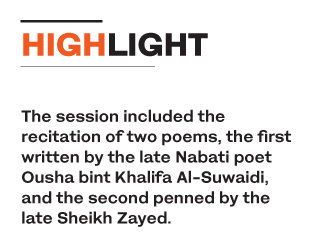Khalaf Ahmad Al-Habtoor, founding chairman of the Al-Habtoor Group, hosted the sixth Open Talk session in partnership with the UAE Ministry of Interior on Wednesday at the Al-Habtoor Group headquarters. Al-Habtoor was joined by a panel of guests including Abdul Ghaffar Hussein, a UAE author; Dr. Rafia Ghubash, founder of the Women’s Museum and trustee of the Emirates Literature Foundation; Brig. Gen. Salah El-Ghol; and Ret. Brig. Gen. Mohammed Saleh Beda.
The forum paid tribute to the late Sheikh Zayed bin Sultan Al-Nahyan, founding father of the UAE, and the late Sheikh Rashid bin Saeed Al-Maktoum, founding father of modern Dubai, who led the UAE’s transition into the modern age, instilling the values of moderation, tolerance, mutual respect and empowerment.
Recounting personal stories when he was a young man, Al-Habtoor said: “The hearts of Sheikh Zayed and Sheikh Rashid were filled with generosity and love for their people. They did not differentiate between religions and spread the message of tolerance and peaceful coexistence to the world. From his humble background, Sheikh Zayed accomplished things that no one else in the world has been able to do.”
 “To this day, we honor the late Sheikh Zayed bin Sultan Al-Nahyan and the noble values of respect, acceptance and diversity that have become a cornerstone of our culture. His determination and vision have shaped our nation to become a global leader in business, technology, innovation, education, health care, the arts and humanitarian aid,” added Al-Habtoor.
“To this day, we honor the late Sheikh Zayed bin Sultan Al-Nahyan and the noble values of respect, acceptance and diversity that have become a cornerstone of our culture. His determination and vision have shaped our nation to become a global leader in business, technology, innovation, education, health care, the arts and humanitarian aid,” added Al-Habtoor.
The panelists discussed the founding father’s vision for the nation, drawing similarities in his visionary leadership style to that of Gamal Abdul Nasser, the former president of Egypt, and Nelson Mandela, the former president of South Africa.
Ret. Brig. Gen. Beda said: “Sheikh Zayed built a robust nation in 30 years with first-class infrastructure, schools and hospitals. Thanks to his efforts, we are recognized as leaders by our accomplishments worldwide.”
Author Hussein underlined that the late Sheikh Zayed had rare qualities. “Leading up to the unification in 1971, Sheikh Zayed played an important role in being a tolerant leader, specifically in the negotiations on the unification of the UAE.”
“We should remember that the late Sheikh Zayed wanted to strike a balance between a modern country and tradition. He was wise to say, ‘The ones who don’t have a past, don’t have a future,’” said Dr. Ghubash.
The session included the recitation of two poems, the first written by the late Nabati poet Ousha bint Khalifa Al-Suwaidi, known as Fatat Al-Arab (Girl of the Arabs), and the second penned by the late Sheikh Zayed.
Dr. Ghubash said: “Sheikh Zayed conveyed an important message to society stating that a woman is a valuable asset to society.”
“Al-Suwaidi gained recognition from the late Sheikh Zayed who commended her for her work in highlighting the natural beauty of the Emirates and the local language through her work. Her poems have enriched the Emirati memory with wisdom, knowledge and creativity,” she added.















